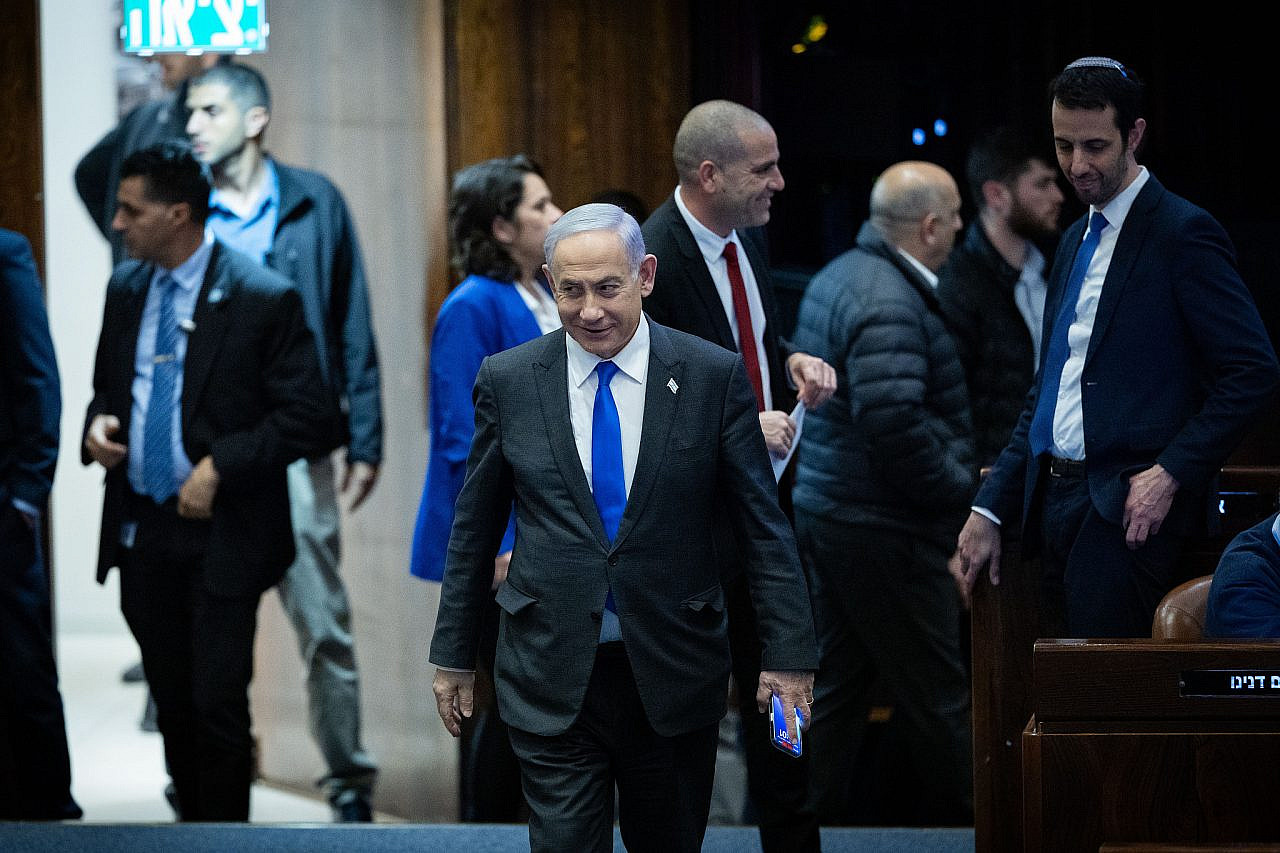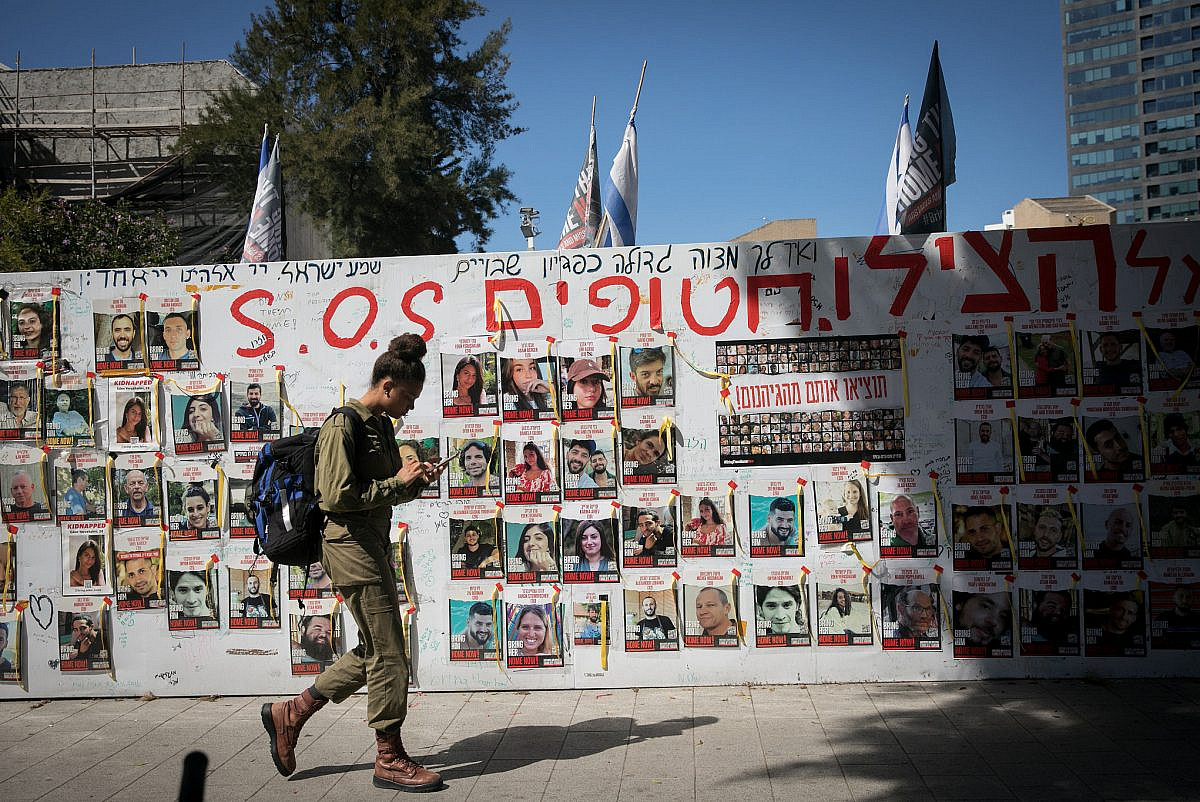For most Israelis, the war has become routine. They’ve learned to live with it. It’s uncomfortable, they think, but there’s no other choice.
Of course, not everyone shares in this sense of complacency — the bereaved, the survivors, the wounded, the evacuees, and the families of those still held hostage in Gaza. And, of course, Israel’s Palestinian citizens, many of whom have lost friends or relatives in the besieged Strip, and have watched in horror as their Jewish neighbors and colleagues justify Israel’s brutal onslaught. These victims of the war struggle against the new normal, but their success is limited.
The weekly demonstrations for the release of the remaining hostages may have stepped up a gear in the past couple of weeks, with an outburst of rage toward Prime Minister Benjamin Netanyahu over his apparent foot-dragging in negotiations for a ceasefire and hostage-exchange deal. But these protests still pale in comparison to last year’s demonstrations against the right-wing government’s judicial overhaul, the 2020 protests against Netanyahu, and the 2011 protests against the surging cost of living. All the while, Israel appears to be pushing ahead with its offensive in Gaza — paying no heed to the International Court of Justice or the UN Security Council — and perhaps even angling for a broader regional escalation, at least on the northern front with Hezbollah, following its attack on the Iranian Embassy in Damascus at the start of the month.
This new normal, which for now seems impossible to break through, did not appear out of nowhere. Rather, it is actively being produced, every single day, by those who have an interest in maintaining it — a broad coalition of individuals and groups each with distinct motivations.
Let’s start with the defense minister, Yoav Gallant, and the senior military leaders. They know full well that reserve units cannot be mobilized indefinitely, and they are clear-eyed about the hit that Israel’s carefully curated reputation is taking in the international community as a result of the way it is prosecuting the war. But they also understand that as long as the war continues, there will be no public pressure on them to take responsibility for the grave failures that led to October 7. If they can notch a few victories in the war, perhaps, they hope, they will not go down in history as the worst leaders Israel ever had. So they talk about a war that will last for years.
It is well documented that Netanyahu is motivated by a similar logic. As long as the country is at war, he will remain at the helm and be able to delay or even cancel his long-awaited corruption trial — so why bother ending it?

For his coalition partners, the new normal is a blessing. The far-right Religious Zionist Party and Otzma Yehudit (Jewish Power), led by Bezalel Smotrich and Itamar Ben Gvir respectively, see the war as a way of life and as an application of their core political principles: the expansion of Jewish supremacy and the crushing of Palestinian nationalism. The ultra-Orthodox, meanwhile, connect to the far-right parties’ messianic euphoria through the religious notion of Jewish “chosenness.” But they also have a financial incentive for continuing to support the war: Smotrich, in his capacity as finance minister, recently allocated a hefty government budget to the ultra-Orthodox parties in order to buy their loyalty.
Even the Biden administration is normalizing the war. Biden refuses to push for a permanent ceasefire, or to pressure Israel to end its operation in the Strip. The American abstention from the recent Security Council resolution calling for an immediate ceasefire was hardly a full-throated endorsement of the proposal — not least when the U.S. Ambassador to the UN immediately sought to dismiss it. Biden has repeatedly expressed concern about the lack of Israeli plans to protect Palestinian civilians and humanitarian aid workers — especially in the event of a Rafah invasion — and pressed Israel on its vision for the “day after,” but refuses to say enough is enough.
Moreover, Biden has created a division of labor for him and Netanyahu: the U.S. alleviates some of the plight of civilians in Gaza with aid drops, while Israel attacks and continues to starve them. Biden also hasn’t presented his own proposal for the “day after,” instead gesturing at a vague process at the end of which, somehow, lies a two-state solution. Netanyahu delights in the vagueness of the suggestion and emphasizes its infeasibility.
Standing awkwardly on the sidelines are the Israeli center and the Zionist left. They have always been exemplars of Israeli militarism, if not the military’s very leaders. They are therefore unable to oppose this militarism, especially in wartime, despite their alarm at the religious-Zionist takeover of Israel’s security forces.
Before the war, few of them concerned themselves with the plight of the Palestinians besieged inside the Gaza Strip, or even advocated negotiating a political agreement with the Palestinian Authority (PA). The vast majority of them agreed fully with Netanyahu’s policy of “managing the conflict,” and they, too, ignored Hamas’ willingness to move toward a united front with the PA, as shown by its 2017 “General Principles and Policies” document that effectively recognized the Oslo Accords as an established fact, and its 2021 agreement with PA President Mahmoud Abbas on holding general elections. Since October 7, what little enthusiasm existed on the Zionist left and center for a political agreement with the Palestinians has been entirely quashed.
In the typical style of Israel’s center-left governments between the 1950s and 1980s, especially that of the self-righteous Golda Meir, they say they are sorry for the Palestinian suffering, “but we have no choice.” They barely mention military and settler brutality and ethnic cleansing of Palestinians in the West Bank and Jerusalem. And, of course, they strongly oppose the cases being brought against Israel in The Hague. The result is an updated version of “conflict management” — one that, despite their other differences, unites virtually all currents of Israeli politics.
Most read on +972
What could shift this reality of war as routine, for better or for worse? I see three possibilities, which are not mutually exclusive.
The first is a radical Israeli move in Lebanon or an invasion of Rafah, which could come as a result of an uncontrollable local escalation or Israeli miscalculation. The second possibility is an American decision to demand a permanent ceasefire, together with an international military coalition that would replace the Israeli military presence in the Gaza Strip. And the third option is the awakening of Israel’s industrial-business sector, for whom the war is not routine but rather a serious disruption to business-as-usual. Politically and socially, this sector is located both on the political right and the center. It oiled the wheels of protest against the judicial overhaul, and, if activated, could bring about a new round of elections and a subsequent change in the war’s prosecution.
A version of this article was first published in Hebrew on Local Call. Read it here.





